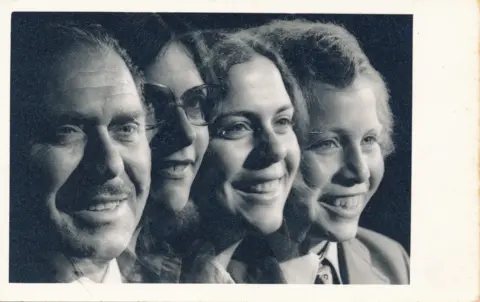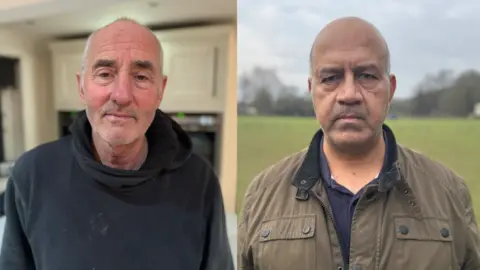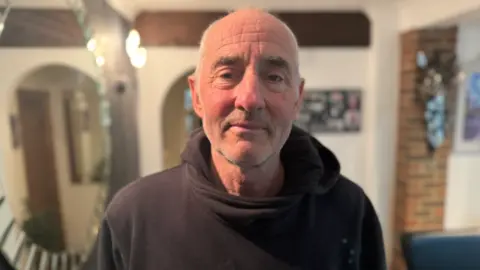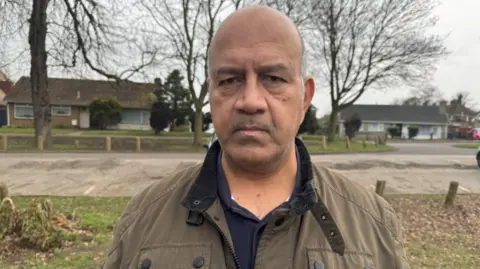NewsBeat
Marilyn Manson sexual assault investigation dropped by lawyers

A years-long investigation into Marilyn Manson over sexual assault and domestic violence allegations has been dropped, California prosecutors said on Friday.
Prosecutors said in a statement the allegations against Manson exceeded the statute of limitations, adding “we cannot prove charges of sexual assault beyond a reasonable doubt”.
Four women had filed lawsuits against Manson – whose legal name is Brian Warner – accusing him of rape, sexual assault and bodily harm.
Through his lawyer, Warner repeatedly denied the accusations and dismissed the claims as “falsehoods”.
Howard King, Warner’s attorney, said in a statement to the BBC that they are “very pleased” with the decision, and that his client has always maintained his innocence.
The four women who filed lawsuits accusing Warner of sexual and physical abuse include model Ashley Morgan Smithline, Game of Thrones actress Esmé Bianco and Warner’s former personal assistant Ashley Walters. The fourth woman chose to remain anonymous.
“We recognise and applaud the courage and resilience of the women who came forward to make reports and share their experiences,” Nathan J Hochman from the Los Angeles County district attorney’s office said in the statement.
“We thank them for their cooperation and patience with the investigation.”
Authorities began their investigations in 2021, looking into alleged incidents between 2009 and 2011 in West Hollywood, where Warner lived.
In total, more than a dozen women had made allegations against the rock star, including his ex-fiancée Evan Rachel Wood.
Smithline – who filed the most recent lawsuit of the four women – said in court documents that Warner had “repeatedly threatened” her life, saying he would “find her” and “kill her if she left him”.
Her testimony echoed the experiences of Walters who, in court documents, described Warner as a terrifying and violent boss who gave friends permission to grope and kiss her. He also made her work for 48 hours in a row.
Since the allegations were made, Warner’s record label, booking agent and manager have severed ties with him.
“Obviously, my art and my life have long been magnets for controversy, but these recent claims about me are horrible distortions of reality,” Warner wrote in an Instagram post in February 2021.
NewsBeat
18-24 January 2025: Photos of the week

A selection of news photographs from around the world.
 FRANCK ROBICHON/EPA
FRANCK ROBICHON/EPA Morry Gash/AP
Morry Gash/AP OMAR AL-QATTAA/AFP
OMAR AL-QATTAA/AFP JOSPIN MWISHA/AFP
JOSPIN MWISHA/AFP Wang Qingwu/VCG via Getty Images
Wang Qingwu/VCG via Getty Images Yuichi YAMAZAKI/AFP
Yuichi YAMAZAKI/AFP Chalinee Thirasupa/REUTERS
Chalinee Thirasupa/REUTERS Amit Machamasi/ZUMA Press Wire/Shutterstock
Amit Machamasi/ZUMA Press Wire/Shutterstock Jane Barlow/PA
Jane Barlow/PA Hector Quintanar/Getty Images
Hector Quintanar/Getty ImagesNewsBeat
‘The reappointment of a dictator by a dictator’: Lukashenko set for 7th term as Belarusian president | World News

I’m staring into the eyes of Vladimir Lenin, the Russian revolutionary who founded the Soviet Union.
It feels like I’ve travelled back in time. In fact, I’ve come to the headquarters of the Communist Party of Belarus.
A huge portrait of Lenin dominates the room in which I’m interviewing Sergei Syrankov, the party chief. He is one of five candidates in Sunday’s presidential election.
It seems Lenin isn’t the only leader he admires. Presidential incumbent Alexander Lukashenko appears to have achieved hero status too.
“We call him Bat’ka,” says Sergei Syrankov, referring to Belarusians’ affectionate nickname for the 70-year-old, meaning ‘father’.
“Bat’ka is not only the person we have to thank for a child’s birth, Bat’ka will also feed the child, protect them, get them on their feet, and create all the conditions for their development and confidence in their future.”
It says a lot about an election, and a country, that a candidate endorses his rival rather than criticises him.
But this is not a normal election. The winner is not in doubt.
After 31 years in power, Lukashenko is set for a seventh consecutive term, even though he’s not campaigning.
On a recent factory visit, he told workers that he didn’t have time for it, claiming he’s too busy working for the nation.
Others are still canvassing for votes, however, giving the illusion of choice.
Outside an upmarket shopping centre in downtown Minsk, the Belarusian capital, we meet Anna Kanopatskaya, who is running as an independent.
She and a handful of supporters are doing their best to distribute leaflets, asking passers-by for their vote.
But even this supposed- opposition candidate struggles to find fault with Bat’ka when I ask what is wrong with his leadership.
“What’s wrong?” Ms Kanopatskaya repeats, sounding surprised.
“Presumably you think something’s wrong with it if you want to replace him,” I suggest.
After some hesitation, she replies “First of all, he’s not so young and he’s not such an effective and progressive a manager”, before quickly adding that sometimes he is “very successful”.
By ensuring his rivals double up as supporters, Lukashenko has clearly learnt his lesson after the last election in 2020 triggered days of mass protests.
He was accused of stealing victory from the opposition and the wave of unrest that followed nearly swept him from power.
It was only after a brutal crackdown, in which tens of thousands were detained, that he regained control.
Read more:
Lukashenko urges Russia and Ukraine to end war
Belarus starts receiving tactical nuclear weapons
Opposition leader Sviatlana Tsikhanouskaya has been in exile ever since. Speaking to Sky News at the World Economic Forum in Davos this week, she called for Belarusians to boycott Sunday’s poll.
“It will be like an imitation. It will be a farce. It will be like the reappointment of a dictator by a dictator,” she said.
“All these five people who are participating, it’s like a fan club of Lukashenko.”
Those not in the fan club are either too afraid to speak out or have already been silenced by lengthy jail terms.
Some opposition figures have been released in recent months, in a sign Lukashenko may want to rekindle relations with the West. But there is a long way to go before he can claim Belarus is free of repression.
According to human rights groups, more than 1,200 political prisoners remain behind bars.
NewsBeat
Pete Hegseth confirmed as Trump’s defence secretary

Pete Hegseth, Donald Trump’s nominee for US defence secretary, was confirmed by the Senate late on Friday night, after facing misconduct allegations that nearly derailed his confirmation.
Vice-President JD Vance cast the tie-breaking vote in Hegseth’s favour, after three Republican senators, including former Senate majority leader Mitch McConnell, voted against him.
During Hegseth’s confirmation hearing, he faced multiple questions about an allegation of sexual assault, which he has denied, as well as infidelity and drinking.
The former combat veteran and one-time Fox News television host will oversee a department of some three million employees and a $849bn (£695bn) budget.
Four Republicans would have needed to join the 47 Democratic and independent senators who voted against Hegseth for his nomination to be defeated.
McConnell’s surprise vote left the Senate in a 50-50 deadlock before Vance arrived to cast the tie-breaker.
Vance is only the second Vice President in US history to break a tie to confirm a cabinet nominee. Trump’s previous VP, Mike Pence, became the first when he broke the tie to confirm Betsy DeVos as education secretary in 2017.
“Warfighting, lethality, meritocracy, standards, and readiness. That’s it. That is my job,” Hegseth said during the confirmation hearing earlier this month.
Democratic senators questioned Hegseth, a military veteran, about his qualifications to lead one of the nation’s largest agencies.
Hegseth, 44, a veteran of the wars in Afghanistan and Iraq, later worked at Fox. He has little of the traditional experience expected for a national security cabinet position – a role typically filled by senior civil servants, experienced politicians, generals and high-level executives.
Hegseth also was asked during the hearing, particularly by female senators, about his previous comments that women should not serve in combat roles. He responded that his concern was not women serving in combat, but in maintaining a certain standard in the US military.
His confirmation process was overshadowed by allegations of misconduct. He was accused of sexually assaulting an unnamed women in 2017 in a Monterey, California, hotel room. He has denied the accusation repeatedly.
The newly confirmed defence secretary also faced allegations of excessive drinking, including at work events, and infidelity in his previous two marriages.
“I am not a perfect person, but redemption is real,” he said during the hearing.
Earlier this week, he was accused of alcohol and spousal abuse in a sworn affidavit given to a congressional committee by his former sister-in-law. Hegseth’s lawyer denied the allegations.
But many Republicans, including Trump, have maintained their support for Hegseth.
For Alaska Senator Lisa Murkowski, a Republican who voted against confirmation on Friday, past allegations helped swayed their vote.
In a statement released days before the vote, she said his past behaviour, “demonstrates a lack of judgment that is unbecoming of someone who would lead our armed forces”.
Meanwhile, Maine Senator Susan Collins, another Republican who voted against Hegseth, said she was “concerned that he does not have the experience and perspective necessary to succeed in the job”.
NewsBeat
The French winemaker whose wines are illegal in his home country

Business reporter
 Chapoutier
ChapoutierWinemaker Maxime Chapoutier would be arrested if he tried to sell two of his newest wines in his native France.
“There would likely be outrage about these wines in France, and that would be a good thing,” he says. “Sometimes you need to be provocative to drive change.”
The two bottles in question, one white and one red, would be illegal in France because they are made from a blend of French and Australian base wines.
Under both French and European Union law it is forbidden to make a wine that combines EU and non-EU fruit. In France in particular, authorities take such things very seriously.
The French wine industry has a celebrated word called “terroir”, which applies to all the environmental factors that effect vines growing in a vineyard, such the soil, the climate, and the elevation. As a result, wines from a specific place are held in the highest esteem.
Add a strict appellation or classification system for France’s wine regions, and the thought of blending French and Australian wine to create a global hybrid would horrify many French wine lovers.
Yet Maxime has done just this, and it is all thanks to one word – Brexit.
For while he cannot sell the two wines in the EU, he can do so in the UK now that London no longer has to follow food and drink rules set by Brussels.
Maxime has created the wines in partnership with UK online retailer The Wine Society, where they are called Hemispheres Red and Hemispheres White. The red is made from syrah grapes, or shiraz as they are called in Australia, while the white is a blend of marsanne and viognier varieties.
The Australian red and white wine components are shipped in bulk to the UK, where they are blended with wine from France’s northern Rhone and Roussillon regions before bottling.
Maxime who works for his family’s celebrated Rhone-based wine company Chapoutier, say that while he respects France’s focus on terroir, there should be room for global blends to also be sold.
“Chapoutier has been making wine for more than 200 years, very terroir driven, and biodynamic,” he says. “But more and more people are turning their back on French wines because they don’t understand the complicated appellation rules.
“We need to adapt for consumers and make wines more accessible, which international blends can help to do. Maybe the EU law will change. It is also more ecological to ship wine from Australia to Europe in bulk, as you don’t have the weight of all the glass bottles.”
 Getty Images
Getty ImagesAnother wine company now making wines by combining grapes from two continents is Australian firm Penfolds. It sells reds made from both Australian and Californian grapes, and others that mix Australian and French. Again they cannot be sold in the EU, but they can in the UK, US, Australia and elsewhere.
Penfolds refers to these blends as “wine of the world”, and says that they “possess an otherness that can best be described as worldly”. Whatever that is supposed to mean.
Unsurprisingly, some more traditional winemakers are not in favour of this development. One such person is Jas Swan, an independent winemaker based in Germany.
While the two-continent blends from Chapoutier and Penfolds are made with care from quality grapes, and priced accordingly, she is fearful that if the trend grows it will mean a lot more cheap, low-grade wine going on sale.
“I believe that those types of wine would have nothing left of any terroir, even before they left their continent,” she says. “Those wines would have seen only machine work, heavy additions to keep them clean, and are manufactured to be easy to drink for the masses.
“Why can consumers not be more demanding? The consumerism is insane.”
 Tabea Treichel
Tabea TreichelPeter Richards, who holds the top global wine industry qualification, the master of wine (MW), is also sniffy. “The notion of cross-country blending for wine isn’t something I find outrageous in itself,” he says. “My concern is more that this is about creating novelty for novelty’s sake.”
His wife, Susie Barrie, who is also an MW, adds: “I remain to be convinced that a wine made by blending grapes from different countries can be great in terms of taste.”
By contrast, wine writer Jamie Goode says that development of two-continent wine “is actually quite a fun idea”.
“If the wines are good, and made well from good vineyard sites – and not simply a gimmick blending together cheap bulk wines and then slapping a huge margin on the wine – then this is quite interesting.
“The fundamental basis for fine wine is the notion of terroir – that wines come from a place, and their flavour expresses this place in unique ways. But not all wines have to be terroir wines, and there’s room for wines like this.
“In some ways, there’s a lot of skill required to blend the right wines together to create something interesting coming from such different places.”

Pierre Mansour, head of buying for The Wine Society, says he and his colleagues came up with the idea of creating two wines made from grapes from different continents as part of the company’s 150th birthday celebrations.
“We were thinking about the future of wine, and we wanted to do something innovative. In the end we thought that one area of innovation is blending, of creating a wine that can mitigate for the impact of climate change on a particular country.
“And from a carbon footprint out of view, it is more environmentally friendly to ship wine in bulk from Australia to the UK. But at the same time we did expect ‘terroirists’ to say ‘hold on this is fundamentally against the French principal of wine’.
“So we approached Chapoutier, thinking that they might say ‘are you mad, how dare you insult us’, but they were great. They were really enthusiastic.”
NewsBeat
Almost everything Trump did in his whirlwind first week

The new president promised to make heads spin on day one. The BBC’s Analysis Editor Ros Atkins tries to keep up with what just happened.
NewsBeat
Her grandfather drove trains to Auschwitz. My great-grandmother was murdered there

 Amie Liebowitz
Amie LiebowitzIt doesn’t matter how much you prepare for it. It still takes you by surprise. As the great-granddaughter of a woman who was murdered in Auschwitz, I am meeting the granddaughter of a man who drove Jews to their death. I’m lost for words.
I never got to meet my grandfather Ludvig, who survived the Holocaust, or his mother Rachel. They were put onto a cattle cart to the Auschwitz death camp in 1944. Ludvig, who was about 15 at the time, was separated from his mother and sent to another concentration camp. But Rachel was tortured, gassed and murdered.
I grew up hearing so many stories about them, and spending time with other Holocaust survivors in my family in Australia. They were at the forefront of my mind when I found myself in Germany interviewing Cornelia Stieler.
Cornelia’s grandfather was the main breadwinner in a household with very little income. He originally worked as a coal miner, but after a near-fatal accident which left him trapped under coal for two days, he decided to do something else. Things turned around when he eventually got a job at Deutsche Reichsbahn as a train driver. Cornelia’s mother used to speak of that achievement with pride, saying getting the job was “the chance of a lifetime”.
At first, he was transporting goods for the war effort. But it soon turned into something more sinister. “I believe that my grandfather served as a train driver, commuting between the death camps. He stayed in Liegnitz, now Legnica, in a boarding school, so there was a certain separation from the family and between the death camps.”
Cornelia says that when her grandfather first started the job, he didn’t know what it would become. “I think my grandfather saw a lot of horrible things and didn’t know how to get out of this work, didn’t know how to deal with it.”
After training as a family therapist, she delved into her past and tried to understand him better. She tells me she started asking: “At what point was he a perpetrator? Was he an accessory to perpetrators? When could he have left?”
At this point, my mouth is dry. My heart is racing. Listening to all of this feels like an out-of-body experience. All I can think about is how her grandfather drove trains into Auschwitz, and that’s how my grandfather and great-grandmother ended up there. I’m thinking about all my other relatives – cousins that I know existed but know nothing about – who were murdered in Auschwitz too.
 Liebowitz family
Liebowitz family“If I were any younger, I think I’d feel a strong hate towards you,” I tell her, fighting back tears. “But I don’t because saying all of those things must have been really difficult to admit.”
“Give me your hand,” Cornelia says, also welling up. “It’s important. Your tears, and my touch, are touching me… My grandfather was a train driver in Auschwitz. What can I say? Nothing.
“I can’t apologise, it’s not possible,” she adds, implying the crime is too grave. “My grandfather felt very, very guilty, and he died with his guilt.” Cornelia thanks me for my openness and says there’s a need to fully uncover the history.
Then she says something you might not expect – that some Germans from Schönwald, where her family came from, had reacted angrily to her research. The now Polish town renamed Bojków, some 100km from Kraków, hasn’t come to terms with its Nazi past.
Cornelia explains that originally, the town was against the ideology of the Nazi Party, but over time, became consumed by it. Hitler saw Schönwald as a model village – an Aryan village in a land of Slavs. He was hoping that a “fifth column” of ethnic Germans there would become a useful aid in the military.
It was the site of the Gleiwitz incident – a false flag incident staged by Nazi Germany in 1939 to justify the invasion of Poland, one of the triggers of World War Two. And in 1945, towards the end of the war, it was the first German village to be attacked by advancing Soviet forces.
But just before that, it was the scene of one of the Nazis’ so-called death marches.
 Liebowitz family
Liebowitz familyAs Soviets approached Auschwitz, Hitler’s elite guard, the SS, forced around 60,000 prisoners there – mostly Jews – to move further west. Between 19 and 21 January 1945, one of those marches passed through Schönwald. In below freezing temperatures, the prisoners were dressed only in their thin striped uniforms with just wooden shoes on their feet. Those who collapsed from starvation and exhaustion were shot.
Those who survived were put onto open cattle cart trains heading further west, usually to other concentration camps, like Buchenwald. The Nazis wanted to hold onto their slave labour – even at this point, some still believed in an ultimate triumph of the Third Reich.
A local history and religion teacher, Krzysztof Kruszynski, takes me to the main street where the death march passed. People wait to catch their bus outside the main church on Rolnikow Street – known as Bauer-Strasse in German times. He points to ground, and tells me these are the original cobble stones that the prisoners had to walk on.
“It is a silent witness of the death march,” he says. “But the stone cannot talk.”
 John Murphy
John MurphyThis history has been buried until now – partly because Germans from Schönwald were forced to flee after the Soviet attack that came soon after and Poles resettled the village. One German-Polish woman in her 80s, Ruta Kassubek, told me how drunk Soviet soldiers had stormed her family home and murdered her father. But there’s another reason: an active suppression of the past.
It didn’t surprise me that some Germans had responded negatively to Cornelia’s research. Germany prides itself on its Erinnerungskultur, or culture of remembrance: mandatory Holocaust education, museums, memorials. But many see that as the job of state and government. And while they’re happy enough to face the past in the abstract, it’s harder to deal with their own family history, says Benjamin Fischer, a former Jewish student leader and political consultant. He calls it the “deindividualisation of history”.
A study by Bielefeld University found that a third of Germans believed their family members helped save Jews during the Holocaust. That’s “ridiculous”, says Benjamin, and “statistically impossible”.
On the ground in Bojków, 80 years after the death march, things are changing. Last week, a delegation of Germans, Jews and Poles, including local authorities, schools and emergency services unveiled a new memorial commemorating those who died in the town’s death march.
 IPN K. Łojko
IPN K. ŁojkoCornelia and Krzysztof were there. For Cornelia the history is deeply personal. She is convinced that studying and remembering it is key to understanding how society could change so rapidly. And I’m grateful for it. Their work and passion gives me hope in a world of rising antisemitism – as I try to keep the memory of how my family came to be murdered alive.
The people of Schönwald believed their town lay at the pinnacle of high culture and spirituality. But then it “folded into immorality”, Cornelia says. “This is a development that we need to understand… They weren’t solely good or evil. People can go into jobs with good intentions but very quickly, [find themselves] on the wrong side.
“We can’t change the past. We can’t turn back time. But it’s important to talk about this, to remind people of what happened, to remind people of what humans can do to one another.”
Politics
Hegseth will be Defense secretary. Here's how he plans to upend the Pentagon.


The Senate on Friday confirmed Pete Hegseth for Defense secretary, a triumphant moment for the former Fox News host who overcame allegations of sexual misconduct, alcohol abuse and inexperience to attain one of the country’s most crucial positions.
Republicans largely rebuffed those accusations and approved Hegseth with the help of Vice President JD Vance, who broke a rare 50-50 tie, in the first big nomination fight for President Donald Trump’s Cabinet. Hegseth’s confirmation could smooth the way for other controversial Trump administration picks.
He will enter the Pentagon with a stated desire — and a mandate from the president — to upend traditional practices, from the role of top generals to where U.S. forces are stationed overseas.
The new Pentagon leader embodies Trump’s grievances, particularly about the spread of diversity programs in the military. He insists they have distracted from the force’s core mission of keeping the country safe.
Hegseth will likely spend his first days at the Pentagon addressing Trump’s push to use the military for deportations, assessing global troop deployments, eliminating diversity programs and determining which top military officers will stay in their jobs.
The Defense Department is bracing for change.
“He came across in his hearing like a college junior excited about all the new concepts he learned in class,” said one defense official, granted anonymity to speak candidly about their new boss. “People get that ASEAN isn’t the only acronym he doesn’t know.”
Hegseth, already an unconventional pick for the Pentagon job, was dogged by allegations of sexual misconduct — including a 2017 sexual assault accusation that he denies but for which he paid a financial settlement to his accuser. And just days before the vote, senators received an affidavit from Hegseth’s former sister-in-law alleging that he abused his second wife and regularly abused alcohol. Hegseth has denied all wrongdoing.
All Democrats opposed Hegseth. Three Republicans, Sens. Susan Collins of Maine and Lisa Murkowski of Alaska — and, notably, former GOP Senate leader Mitch McConnell of Kentucky — voted against him.
No GOP defection is more surprising than McConnell. The former leader was the architect of many Republican legislative victories during Trump’s first term, including the confirmation of Supreme Court Justice Brett Kavanaugh amid sexual assault allegations.
The Kentucky Republican, a Reaganite defense hawk who now chairs the panel that controls the Pentagon budget, has set himself up as a counterweight to Trump on foreign policy. He’s attacked the more isolationist Trump-aligned wing of the GOP and recently criticized Trump administration Pentagon hires who have opposed U.S. engagement in the Middle East.
McConnell, in a biting statement after the vote, cast doubt that Hegseth has the experience needed to tame the massive bureaucracy.
“Mere desire to be a ‘change agent’ is not enough,” McConnell said. “And ‘dust on boots’ fails even to distinguish this nominee from multiple predecessors of the last decade. Nor is it a precondition for success.”
Sen. Thom Tillis of North Carolina was seen as a potential defector, but after meeting with Hegseth announced he’d back Trump’s nominee.
Democrats pointed to mounting allegations as proof of Hegseth’s unfitness for the job and a flawed vetting process.
“Of all the people we could have as secretary of Defense, is Pete Hegseth really the best one we’ve got?” Senate Minority Leader Chuck Schumer said. “Come on, you know he isn’t. You know he’s not even close.”
Hegseth’s policy plans are only vaguely known. His views on the Pentagon budget and acquisition process came up during his hearing, but they didn’t differ greatly from the Biden administration’s efforts.
The new Pentagon chief has already promised to bring culture wars to the department. Hegseth, at his confirmation hearing, said troops will “rejoice” at his push away from Biden-era social policies.
“They want to focus on lethality and warfighting, and get all the woke political prerogative, politically correct social justice political stuff out of the military,” he told senators.
Hegseth has also followed Trump’s lead on slamming the military’s top generals as out of touch. He has complained that the Pentagon is top-heavy with three- and four-star generals. But it’s not clear how that changes in the near term, as any purge would have huge consequences down the chain of command.
The fight over his nomination and personal conduct drew comparisons to two past Senate confirmation battles: Kavanaugh and former Sen. John Tower. Republicans likened the allegations against Hegseth to Kavanaugh, arguing both were motivated by partisan attempts to sink the nominees.
Tower, a former Senate Armed Services chair, was rejected by the Senate in 1989 to be then-President George H.W. Bush’s Pentagon chief amid allegations of past alcohol abuse that were corroborated by an FBI background review.
Hegseth pledged not to consume alcohol if confirmed to the job, similar to a promise Tower made in a bid to save his nomination.
Democrats have taken aim at many of Hegseth’s controversial statements — including opposing women in combat roles and gay people serving in the military, criticizing diversity efforts in the ranks and defending U.S. troops convicted of war crimes.
Hegseth has walked back his rhetoric on women in combat and gay troops serving in uniform, although it hasn’t convinced his detractors. Collins said Thursday she was “not convinced that his position on women serving in combat roles has changed.”
His opponents also argued Hegseth — who served in Iraq and Afghanistan and left the Army National Guard as a major in 2021 — lacks the character and professional background to run the government’s largest agency.
Hegseth spun his lack of traditional Pentagon experience as a positive and argued to senators that the bureaucracy would benefit from a leader “with dust on his boots.”
His staunchest allies argued that, while unconventional, he’s Trump’s choice to shake up the Pentagon’s bureaucracy and will be backed by a team of experienced officials.
“He’s not beholden to the status quo and is open to new ideas,” Senate Armed Services Chair Roger Wicker (R-Miss.) said in a speech this week. “He’s intent on lethality and readiness, as we should all be.”
Joe Gould, Paul McLeary and Jack Detsch contributed to this report.
NewsBeat
‘I have become afraid of my own memories’

Reporting from Jerusalem
 BBC
BBCAt some of the many thousands of funerals in Gaza over the past 15 months, mourners have laid a bright orange vest over the body.
The vests are usually well worn and marked by dust, sometimes blood. They belong to the Civil Defence, Gaza’s main emergency service.
Throughout the Israeli bombardment, the Civil Defence was responsible for pulling the living and the dead from the rubble. Along with Gaza’s ambulance service, the rescue workers have taken on some of the most harrowing work in the strip.
And they have paid a steep price. On the first full day of peace on Monday, the agency said that 99 of its rescue workers had been killed and 319 wounded, some with life-changing injuries.
When the Civil Defence buries its own, where possible the vests of the dead are laid on their bodies.
“We put the vest there because our colleague sacrified his soul in it,” said Nooh al-Shaghnobi, a 24-year-old rescue worker, in a phone interview from Gaza City.
“We hope it will show God that this man did good with his life, that he saved others.”
 AFP
AFPIsrael killed more than 47,000 Palestinians in Gaza during the conflict – mostly women and children – and wounded more than 111,000, according to the Hamas-run health ministry, whose figures seen reliable by the UN. A recent study published by the Lancet medical journal found that the death toll during the first nine months of the war may have been underestimated by more than 40%.
The fragile ceasefire that came into effect last weekend is holding. But for the rescue workers of the Civil Defence, the next phase of their work is just beginning.
The agency estimates that there are more than 10,000 people buried under the vast sea of rubble across Gaza. The figure is based on information collected throughout the war about who was in each building destroyed by Israel, and who the agency knows to have been recovered already.
In areas that were completely occupied by Israeli forces during the destruction, they do not have detailed information and are relying on residents to help them. In the Tel el-Hawa neighbourhood of Gaza City on Tuesday, rescue worker Al-Shaghnobi found a man with information about the fate of a flattened apartment building.
“He told us seven dead were recovered, but there was an elderly gentleman, a child and an infant left behind,” Al-Shaghnobi said.
“Fortunately there was a privately-owned bulldozer nearby and we were able to excavate the top layer of rubble,” he said. “And underneath we found three skeletons that matched the description.”
 AFP
AFPAl-Shaghnobi has accrued a large following during the war by sharing his experiences on social media. Though he pixelates some images, others show the horrors he and other young rescue workers have faced.
One video shows him under the rubble, carefully extricating the body of an infant from around the body of another small child, who is alive. Other images he sent to the BBC show the extreme nature of the rescue work.
“You should become numb as time goes on,” Al-Shagnobi said, during a shift in Gaza City. “But I have become worse. I feel more pain, not less. I find it harder to cope. I have seen 50 of my colleagues die in front of me. Who outside of Gaza can imagine this?”
As the first of the Israeli hostages were released from Gaza last week, in exchange for 90 Palestinians from Israeli jails, Israeli authorities described the extensive psychological support waiting for the returning hostages.
But for those experiencing horrors in Gaza, such support is extremely limited. None of the four rescue workers who spoke to the BBC this week from Gaza said they had been offered counselling.
“We all need this,” said Mohammed Lafi, a 25-year-old rescue worker in Gaza City, “but no one talks about it.”
Lafi, who has been with the agency for six years, has a wife and infant son at home. “When I pull the body of a baby from the rubble I scream inside myself if he is the same age as my son. My body shakes.”
 Reuters
ReutersEven if counselling were to be widely available, “a year of therapy would not be enough for one day of this job,” said Abdullah al-Majdalawi, a 24-year-old Civil Defence worker who lives with his parents in Gaza City.
Al-Majdalawi said that when he returned to his home between shifts he did small jobs and chores constantly, “because I have become afraid of my own memories”.
“I am very solitary now,” he said. “I do not really talk to others about what I have seen. But I feel that my whole body is becoming tight, and I need some kind of therapy because things are accumulating.”
The Civil Defence workers had come to be viewed from the outside as heroes, Al-Majdalawi said. “But they do not see what is happening inside. Inside I am fighting a war against myself.”
As the ceasefire began, new images from inside Gaza showed scenes of near-total destruction, particularly in the north of the enclave. Civil Defence spokesman Mahmoud Basal said that the agency hoped to recover the remaining dead from under the rubble within 100 days, but he acknowledged it was a difficult target, because they have virtually no bulldozers and other heavy equipment yet.
The Civil Defence has accused Israel of deliberately targeting and destroying its vehicles and equipment in strikes – an accusation Israel denies. Rescue workers told the BBC they were currently working with simple hand tools like hammers and had few working vehicles. “We have so little equipment we need another Civil Defence to rescue the Civil Defence,” Al-Majdalawi said.
A spokesman for the agency said on Friday they had been able to recover just 162 bodies since the ceasefire began nearly a week ago.
 AFP
AFPThe UN aid coordination office OCHA has warned that the recovery of the bodies could take years, owing to the lack of equipment, personnel, and what it estimates is 37 million tonnes of rubble littered with unexploded bombs and dangerous materials like asbestos.
The amount of time that many of the dead also hinders the identification process. At the European Hospital in Khan Younis in the south of Gaza, people were searching for loved ones this week among remains brought to the hospital and laid outside on white sheets. In many cases, the only option was to search for shoes, clothes or other personal effects.
“I believe I will recognise my son immediately, even if his face has no features and he is only a skeleton,” said Ali Ashour, a university professor, of his 18-year-old boy Mahjoud.
“I will recognise him because I am his father and I know him better than a million people,” he said.
Ashour still harboured hope that Mahjoud might have been taken prisoner, he said, but he planned to search the dead every day until he knew. “Any time they bring more remains I will come,” he said. “And if I see my son I will lift him out from between the other bodies and carry him away.”
Nisreen Shaaban was searching for her 16-year-old son Moatassem, who she said had left their home in Beit Hanoun for 15 minutes and never returned.
“I have opened every shroud here looking for the clothes he was wearing, trying to smell his scent,” she said. She was surrounded by human remains. “I feel as though I am living in a cemetery,” she said. “It is a city of horrors.”
The Civil Defence agency estimates that nearly 3,000 people may have been incinerated in the bombardment, robbing some families of an end to their search. But there are many more than that who still need to be recovered.
“These people need to be found and honoured,” Al-Shaghnobi, the rescue worker, said. “This work awaits us. All we need is the equipment and we will do it.”
Muath Al-Khatib and Amr Ahmad Tabash contributed to this report.
NewsBeat
Private parking firms should not regulate themselves

BBC News, East Midlands
 BBC
BBCAn MP who says he is receiving “more and more” complaints about private car parks says the sector should not be left to regulate itself.
Derby South MP Baggy Shanker says he has been contacted by numerous people who have been penalised at the controversial Copeland Street car park in his constituency – including one of his own colleagues.
Following publicity about the case of Rosey Hudson – who was “fined” nearly £2,000 for taking longer than five minutes to pay for parking – the two trade associations for private parking have announced they are setting up a panel to revise and oversee the sector’s own code of practice.
However, Shanker and 11 other MPs are calling on the government to introduce its own statutory code of practice that private car park operators must follow.
Shanker said: “It’s obvious from the enquiries we’re getting now in Derby – and other colleagues are getting across the country – the voluntary code just simply isn’t working.
“They’ve come up with a set of practices that they say they will adhere to, and it’s obvious they’re not strong enough and they’re not being adhered to properly, so the only way we feel this can be resolved is to have a mandatory code.”

He said his colleague received a parking charge notice (PCN) for the same reason as Miss Hudson.
“Basically she’d parked, taken her children to Jumpin Fun, and on another occasion her husband had parked there, and her parents had parked there,” he said.
“It took them more than five minutes [to pay] because of the equipment being poor.”
She and her relatives paid the three £60 PCNs rather than challenging them – and Shanker said many drivers did the same because they were afraid of going to court.
Shanker and the other MPs are arguing that statutory regulation is needed to protect drivers from “unclear and unfair practices”.
In a letter to local growth minister Alex Norris, they wrote: “We believe that relying on self-regulation is insufficient.
“Time and again, statutory regulation has proven the most effective way to protect consumers in other sectors such as banking, energy, and telecommunications.
“It is clear that the same approach must be applied to the private parking industry.”
Those behind the letter include Derby North MP Catherine Atkinson – who has previously raised the issue in Parliament – and Darlington MP Lola McEvoy – who has been helping a constituent asked to pay more than £11,000 in charges.
The letter said each MP had received numerous complaints about operators from drivers who had “faced significant financial penalties for late payment, even when they report making genuine efforts to comply”.
“Contributing factors beyond their control include unclear or misleading signage, malfunctioning payment machines, and insufficient alternative methods for purchasing tickets,” the letter added.

The private parking sector’s existing code of practice was introduced in June 2024 by the British Parking Association (BPA) and International Parking Community (IPC).
These are the two accredited trade associations (ATAs) for private parking operators.
Car park operators need to be a member of an ATA in order to buy drivers’ names and addresses from the DVLA, and therefore be able to send them fines.
Statistics published by the DVLA suggest operators are issuing more PCNs than ever before.
In the first half of the 2024-25 financial year, car park operators paid the DVLA for 7,236,328 keeper details.
This compares to 4,770,984 for the entire 2016-17 financial year. The figure has been steadily increasing each year, apart from a dip during the pandemic in 2020-21.
While these PCNs are often referred to as fines, they are effectively letters asking for money for alleged breach of contract.
Car park operators typically argue drivers have breached a contract by not abiding to the terms and conditions of a particular car park, for example, by not paying for parking within a certain time, or for entering a car registration number incorrectly.

The previous government published a code of practice in February 2022 and it was due to come into effect by the end of 2023.
However, it was withdrawn following legal challenges launched by several parking firms.
Will Hurley, chief executive of the IPC, said this was why the ATAs then introduced their own joint code, as each ATA previously had its own.
“I actually wanted to help the government deliver the single code of practice and have been supportive of that from the very beginning,” he told the BBC.
“The reality is we took the government’s code and we implemented the vast majority of it.”
However, he said he was still supportive of the government introducing a statutory code of practice.

Isaac Occhipinti, head of external affairs at the British Parking Association (BPA), said his association would also support a statutory code of practice.
However, he said amending the industry’s own code of practice would lead to quicker changes.
He added: “We are actually going to be meeting a number of MPs in a couple of weeks’ time to discuss what potential changes we could make to the code of practice, because I think that’s probably a quicker way to actually get changes to happen than to wait for the government code of practice.”
Excel Parking has declined numerous BBC requests for an interview.
However, a representative said via email: “Excel Parking will adhere to any changes made to the private parking industry Single Sector Code of Practice.”
Excel Parking is also continuing to insist that Miss Hudson, who it sent 10 PCNs to, was in the wrong – despite the parking firm having discontinued its £1,906 court claim against her.
“Miss Hudson did not comply with the specified terms and conditions for parking at the Copeland Street car park as she purchased the parking tariffs well beyond the required timescale,” the spokesperson said.

Luke Harrison, a solicitor who has helped more than 20 people fight PCNs free of charge, is sceptical about the sector’s pledge to change.
“Every industry that is doing things that they don’t want to be regulated, the first move is to set up an industry-owned association that sets up a code of practice that they all subscribe to, and then they go to government and say, ‘we’ve got a code of practice, so you don’t need to look into us’,” he said.
“It’s a classic tactic, it’s happened in financial services, it’s happened in all kinds of other industries, this voluntary code of practice approach.”
Mr Harrison said the majority of cases were easy to defend, but added it was not proportionate for most people to spend money on legal advice.
The government is expected to make an announcement on plans for a parking code of practice soon.
A Ministry of Housing, Communities and Local Government spokesperson said: “Motorists must be protected when using private car parks and we are determined to drive up standards in the industry.
“We know how much of an issue this is for drivers, which is why we will set out further details on the private parking code of practice as soon as possible.”
NewsBeat
Dealers sentenced for selling vehicles with clocked mileage

BBC South East Investigations Team
 Josie Hannett/BBC
Josie Hannett/BBCVictims who bought cars and vans with clocked mileage say they feel “mugged off” by the fraudsters who wound back a total of 2,000,000 miles off vehicle odometers.
Ryan Regan, Thomas Hamilton and Darren Cradduck, all from Kent, were all given suspended sentences at Canterbury Crown Court on Friday.
Shaun Thomas, 61, a bricklayer from Hastings, unknowingly bought a van from the group which had had nearly 100,000 miles taken off the odometer.
He said: “Everything seemed to be legit, but I got turned over, I feel a bit of a prat.”
Clocking is when the total miles travelled displayed on a vehicle’s dashboard is tampered with.
The odometer is the device which measures the distance travelled by the vehicle.
By decreasing the mileage on the vehicles, fraudsters can then sell them on for a higher price.
Regan, Hamilton and Cradduck bought 21 high-mileage vehicles at auction and reduced their distance travelled by an average of 90,500 miles each, Kent Trading Standards said.
The largest mileage deduction in one vehicle was 163,000 miles.
 Kent Trading Standards
Kent Trading StandardsMr Thomas bought a Citroën Dispatch from the dealers.
When he took the van for an MOT a year later, he was contacted by the Driver and Vehicle Standards Agency (DVSA) which told him there was a problem with the mileage.
On further investigation by Kent Trading Standards, the total amount clocked was discovered to be nearly 100,000 miles.
Mr Thomas said: “It leaves a sour taste in your mouth really. It had full service history, an MOT on it which was the same as what was on the clock but now we know it wasn’t all true.
“I feel a bit of a mug,” he added.
 Josie Hannett/BBC
Josie Hannett/BBCThe investigation into the group began in 2018 when a victim broke down on the drive to North Yorkshire after purchasing a van in Sandwich.
Kent Trading Standards requested information from online auction sites about the dealers which highlighted 20 different trading names linked to the group, and that the buy and sell mileages did not tally up.
A search warrant was carried out at the unit at the Old Boatyard, Sandwich where fake log books and MOT certificates were found.
Data extracted from the vehicles’ electronic control units were also found not to correspond to the mileage displayed on the dashboard.
 Kent Trading Standards
Kent Trading StandardsKent Trading Standards said it had found evidence relating to 22 victims.
In December, Regan, Hamilton and Cradduck pleaded guilty to conspiracy to commit fraud.
Evidence found on phones, emails and bank accounts also found Cradduck was receiving requests from motorists wanting to clock their lease vehicles so they would not be charged extra for going over their mileage allowance, trading standards said.
He charged £50 per car and called it a “haircut”.
Kent County Council’s barrister said the value of the fraud based on the profit made from the sale of these vehicles amounted to £80,000.
Barrister Alison Lambert told the court documents for 303 vehicles were seized and 98 vehicles’ odometers were proven to have been tampered with.
 Josie Hannett/BBC
Josie Hannett/BBCRaghu Malhotra bought a Volkswagen (VW) Golf for nearly £10,000.
The fraudulent sellers did not have the car’s service history so Mr Malhotra contacted the main VW dealership.
When he bought the car, the odometer was at 44,000 miles.
He said: “I found out the mileages at the service intervals and they were a lot higher than was on the car.”
He sold the car three months later at a loss of £5,000 because of the extra 102,045 miles which had been taken off the odometer by the criminals.
He added: “There’s a big financial loss, and there’s a sense of ‘I should have known better really’.”
 Josie Hannett/BBC
Josie Hannett/BBCClive Phillips, operations manager at Kent Trading Standards, said the investigation was unprecedented in size and scale for Kent County Council.
He said: “Two million miles is shocking, it’s serious offending and that’s why we prosecuted.
“They were significantly reducing the mileage leaving people out of pocket.
“We suspect they’ve clocked a lot more than we are able to prove and show to the court.”
During sentencing, Judge Edmund Fowler said there had been an “inordinate delay” in the case which he had taken into consideration when sentencing.
Ryan Regan and Thomas Hamilton were given a two-year prison sentence, suspended for two years.
Darren Cradduck was sentenced to 20 months imprisonment, suspended for two years.
All three will have to pay compensation and carry out 200 hours of unpaid work.
-

 Fashion8 years ago
Fashion8 years agoThese ’90s fashion trends are making a comeback in 2025
-

 Entertainment8 years ago
Entertainment8 years agoThe Season 9 ‘ Game of Thrones’ is here.
-

 Fashion8 years ago
Fashion8 years ago9 spring/summer 2025 fashion trends to know for next season
-

 Entertainment8 years ago
Entertainment8 years agoThe old and New Edition cast comes together to perform You’re Not My Kind of Girl.
-

 Sports8 years ago
Sports8 years agoEthical Hacker: “I’ll Show You Why Google Has Just Shut Down Their Quantum Chip”
-
Business8 years ago
Uber and Lyft are finally available in all of New York State
-
Entertainment8 years ago
Disney’s live-action Aladdin finally finds its stars
-
Sports8 years ago
Steph Curry finally got the contract he deserves from the Warriors
-
Entertainment8 years ago
Mod turns ‘Counter-Strike’ into a ‘Tekken’ clone with fighting chickens
-
Fashion8 years ago
Your comprehensive guide to this fall’s biggest trends








You must be logged in to post a comment Login